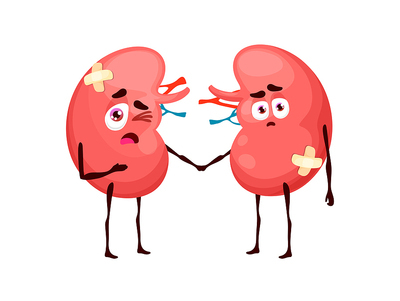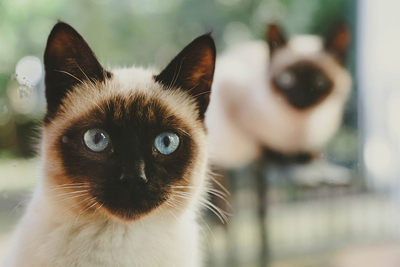Kidney Disease in Cats
Cat Kidney Disease: Understanding and Managing Feline Renal Health
As a responsible pet owner, you must stay vigilant about your feline friend's health. In this article, we'll explore the world of feline kidney disease, covering its causes, symptoms, and natural remedies.
Kidney disease in cats is a common and often misunderstood condition that can significantly affect our feline friends' overall health and well-being. As responsible pet owners, it's crucial to be informed about the physiological changes that occur in a cat's body when diagnosed with kidney disease.
Understanding Feline Kidney Disease:
Cat kidney disease is a prevalent health issue that pet owners should be aware of. The kidneys play a vital role in maintaining a cat's overall health by filtering waste and excess fluids from the blood, regulating electrolytes, and producing hormones.
What causes kidney disease?
1. Age and Genetics: The Uncontrollable Factors:
Just like humans, cats age; as they do, their organs undergo natural wear and tear. Aging is an uncontrollable factor contributing to kidney disease. Additionally, genetics play a significant role. Some breeds are more predisposed to kidney issues than others. Breeds such as Persians, Maine Coons, and Siamese are known to be more susceptible.
2. Dietary Habits: The Role of Nutrition:
Nutrition is a cornerstone of feline health. An imbalanced diet, lacking essential nutrients or high in certain minerals, can strain the kidneys over time. Cats, obligate carnivores, require a diet rich in high-quality protein. Inadequate water intake, often stemming from a dry food diet, may also contribute to kidney stress.
3. Dehydration: The Silent Threat:
Cats are notorious for not drinking enough water. This can lead to chronic dehydration, placing an additional burden on the kidneys. Encouraging adequate water intake through wet food, water fountains, or even adding water to dry kibble can be beneficial.
4. Toxins and Medications: Environmental Hazards:
Cats may come into contact with various environmental toxins, such as certain plants, household chemicals, or even medications. Non-steroidal anti-inflammatory drugs (NSAIDs), commonly used by well-meaning owners for pain relief, can have adverse effects on feline kidneys.
5. Infections and Diseases: Underlying Health Issues:
Chronic infections, like dental disease or urinary tract infections, can gradually compromise kidney function. Diseases such as hypertension or hyperthyroidism can also contribute to kidney problems. Regular veterinary check-ups are essential for early detection and management of underlying health issues.
6. Obesity: The Weighty Concern:
Obesity in cats is a growing concern and is linked to several health issues, including kidney disease. Extra weight can strain the kidneys and exacerbate existing conditions. Maintaining a healthy weight through proper diet and regular exercise is vital to preventing obesity-related complications.
What are the types of Kidney Disease?
Chronic Renal Failure (CRF): This is the most common cause of kidney disease in cats. It often occurs with ageing, as the kidneys gradually lose function over time.
Acute Kidney Injury (AKI): Sudden, severe kidney damage can be caused by factors such as toxins, infections, or urinary obstructions.
Congenital Disorders: Some cats may be born with kidney abnormalities predisposing them to kidney disease later in life.
The Role of the Kidneys:
Before we dive into the effects of kidney disease, let's briefly understand the vital role the kidneys play in a cat's body. The kidneys filter waste products from the blood, regulate fluid and electrolyte balance, and produce hormones that influence blood pressure and red blood cell production. When the kidneys are compromised, these essential functions are disrupted.
The Progression of Feline Kidney Disease:
Feline kidney disease typically progresses slowly over time, and its effects can vary from cat to cat. The condition is often categorised into two stages: early (or chronic) and late (or end-stage) renal failure. During the early stages, the kidneys may still be able to compensate for some loss of function. However, as the disease advances, the kidneys become less effective in performing their crucial tasks.
Decreased Filtration Efficiency:
In the early stages of kidney disease, the kidney’s ability to filter waste products from the blood is compromised. This results in a buildup of toxins in the bloodstream, leading to a condition known as azotemia.
Fluid and Electrolyte Imbalance:
The kidneys play a vital role in maintaining the body's balance of fluids and electrolytes. As kidney function declines, cats with kidney disease may experience imbalances, leading to issues such as dehydration, electrolyte abnormalities, and changes in blood pressure.
Anemia:
The kidneys produce erythropoietin, a hormone that stimulates the production of red blood cells. In kidney disease, decreased erythropoietin production can lead to anaemia, resulting in fatigue, weakness, and pale mucous membranes.
Bone Health:
Kidney disease can also affect calcium and phosphorus metabolism, potentially leading to bone health imbalances. Cats may develop secondary hyperparathyroidism, causing bone resorption and weakness.
Urinary Changes:
Cats with kidney disease often exhibit changes in urination, including increased frequency, changes in colour and odour, and potential blood in the urine. These symptoms may indicate the kidneys' struggle to concentrate and regulate urine effectively.
Symptoms of Feline Kidney Disease:
Cat owners must be observant of any changes in their pet's behaviour or health. Common symptoms of kidney disease in cats include:
Increased Thirst and Urination: Cats may drink more water than usual and experience frequent urination.
Weight Loss and Decreased Appetite: Kidney disease can lead to a loss of appetite and subsequent weight loss in affected cats.
Vomiting and Diarrhoea: Cats with kidney issues may experience digestive problems, including vomiting and diarrhoea.
Lethargy and Weakness: A decline in overall energy levels and weakness may indicate kidney disease.
Poor Coat Condition: Kidney disease can affect a cat's fur, leading to a dull or unkempt coat.
Natural Remedies for Cat Kidney Disease:
Hydration is Key: Ensure your cat has constant access to fresh water to maintain proper hydration.
Balanced Diet: Feed your cat a well-balanced, renal-friendly diet to support kidney function.
Supplements: Consider supplements like omega-3 fatty acids and B vitamins to promote overall kidney health.
Homeopathic Support: Here at Natural Pet, we have developed our Kidney Tonic, a homeopathic remedy to help support cats with kidney disease. It is designed to support the organ and help it to function better. Many of our cat clients do well on our Kidney Tonic.
Regular Vet Check-ups: Schedule regular veterinary check-ups to monitor your cat's kidney health and catch potential issues early.
Management and Support:
Understanding the impact of kidney disease on a cat's body is crucial for early detection and effective management. While feline kidney disease is not curable, its progression can be managed with good homeopathic support and a good diet that may include dietary modifications and good hydration. Regular veterinary check-ups and monitoring are essential to ensure the cat's quality of life is optimised. Understanding the causes, recognising symptoms, and incorporating natural remedies into your cat's care routine are crucial to managing feline kidney disease.
Posted: Thursday 30 November 2023




